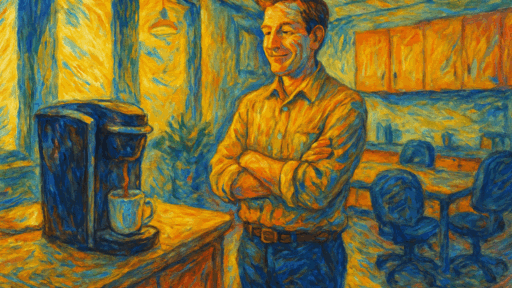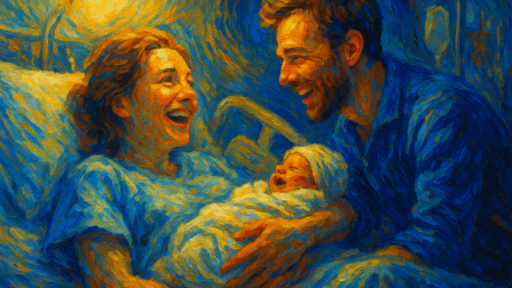“There is no such thing as a perfect parent. So just be a real one.”
Sue Atkins
When our first son was born, I remember standing over his crib like I was supposed to say something important.
I had no idea what that something was.
So I defaulted to what I knew: checked his breathing, adjusted the swaddle for the fourth time, and whispered something that probably sounded like a customer service apology.
He blinked up at me with all the judgment of a person who’d just survived birth and now had me for a guide.
I didn’t have a parenting philosophy. I had Google.
And a vague sense that love and snacks could probably cover most things.
Sixteen years later, that swaddled baby is taller than me and mostly communicates in dry wit, memes, and the sound of his bedroom door clicking shut.
His younger brother, now also a teen, is pure motion.
He enters rooms like an alert. Loud. Unfiltered. Everywhere at once.
I adore them both more than I can say.
I just also sometimes sit in the car for an extra minute before going inside.
That’s not a contradiction.
That’s parenting.
Making it up as we go
Some people have parenting philosophies framed on Pinterest boards.
Ours evolved like most things in nature—through caffeine and mild panic.
One part instinct.
One part improvisation.
One part whatever worked last time.
We never wrote it down, but over the years, a kind of family code emerged—quietly, unevenly, sometimes in the middle of an argument.
It’s less of a manifesto and more of a rhythm. Something lived more than said.
Over time, a few truths took shape:
Be kind, not cutting. It’s okay to be funny. It’s okay to be right. But not if it costs someone else their dignity.
Be curious, not judgmental. Ask questions. Don’t assume. And for the love of God, don’t become a YouTube comments section.
Be honest, not brutal. The truth matters. But how you deliver it matters more.
You can be mad, but you can’t be mean.
You can be frustrated, but you can’t give up—especially on people. Especially on yourself.
You can disagree, but you can’t dehumanize. Not here. Not in this house.
And before you tell your side of the story, ask yourself: If I asked the other person what happened, what would they say?
That last one’s not dogma. It’s a mirror. But it keeps us honest—with them, and with ourselves.
We don’t say all of this out loud, not exactly. It mostly lives in how we show up, how we fail, and how we try again.
They’re not rules. They’re reminders.
And like most things in parenting, they’re written in pencil—with plenty of erasing along the way.
Growing up, all of us
Here’s what no one tells you: the physical part of parenting fades.
Slowly. Quietly. Then all at once.
When they’re small, you carry them everywhere.
You hold their hands across parking lots, kiss their cheeks like it’s your job—because it is.
And then one day, they stop needing to be carried.
They grow into their own gravity. Their own opinions. Their own playlists.
My oldest moves through the house like an old cat—independent, nocturnal, occasionally appearing for snacks and unsolicited historical facts.
My youngest, meanwhile, is powered entirely by curiosity and chaos. He doesn’t enter a room so much as burst into it.
Parenting them now is different.
I don’t reach for their hands in parking lots.
I reach for shoulder squeezes in passing.
Forehead kisses when they’ll allow it.
A quick tousle of hair while pretending it annoys them.
I do it more now, not less.
Not because they need it—because I do.
There’s something quietly beautiful about that shift: from constant closeness to chosen connection.
I don’t carry them anymore. But I still try to stay close.
Because they’re still becoming who they are.
And so am I.
They’re learning to live in the world.
I’m learning how to let them.
We’re all still growing up.
Together.
The constant
The hardest part of parenting might be realizing how temporary everything is.
Phases come and go.
Schedules change.
Interests rotate out like guest stars.
One minute you’re stepping on LEGO bricks, the next you’re debating curfews and car insurance.
But not everything changes.
Here’s what I’m learning—what I’m clinging to:
I don’t have to be perfect.
I just have to stay.
I have to show up.
Keep reminding them that whatever else shifts—however far they drift—there’s one thing they can count on.
We’re still here.
We still love them.
And we always will.
That’s the constant.
Not control.
Not certainty.
Just love. On repeat.
In every form it takes.
Sometimes that means advice.
Sometimes it means silence.
Sometimes it means waiting in the hallway just so they know you’re there.
We won’t get it right every time.
But they’ll know where to find us.
And that matters more than getting it right.






